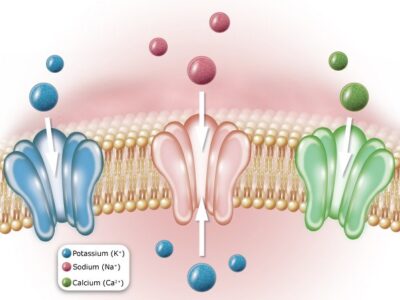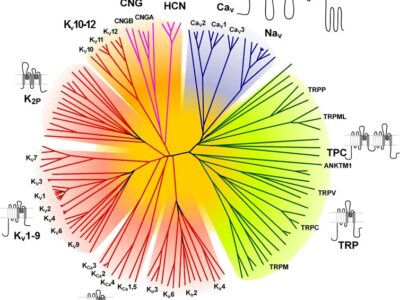Ion channel research is a vast and dynamic field that explores the structure, function, and regulation of ion channels. Ion channels are pore-forming proteins found in the cell membrane of all living organisms. They play a crucial role in numerous physiological processes, including the generation and propagation of electrical signals in nerve cells, muscle contraction, secretion of hormones and neurotransmitters, and regulation of cellular homeostasis.
Here are some key aspects of ion channel research:
Structure and Function: Scientists study the three-dimensional structure of ion channels using techniques like X-ray crystallography, cryo-electron microscopy (cryo-EM), and nuclear magnetic resonance (NMR) spectroscopy. Understanding the structure provides insights into how ion channels function, including their gating mechanisms, selectivity for specific ions, and conduction properties.
Electrophysiology: Ion channel research often involves electrophysiological techniques to measure and analyze the electrical currents flowing through ion channels. Patch-clamp electrophysiology is a widely used method to study ion channel activity at the single-channel or whole-cell level. It allows researchers to investigate the kinetics, voltage dependence, and pharmacology of ion channel function.
Channelopathies: Channelopathies are a group of disorders caused by dysfunctional ion channels. Research in this area focuses on identifying genetic mutations or dysregulation of ion channels that contribute to diseases such as cystic fibrosis, epilepsy, cardiac arrhythmias, and muscular dystrophies. Understanding the underlying ion channel defects helps in developing targeted therapies and designing drugs to modulate channel activity.
Drug Discovery: Ion channels are important drug targets, and research efforts aim to discover and develop ion channel modulators for therapeutic purposes. Screening compound libraries, studying the structure-activity relationship (SAR), and investigating the pharmacological effects of compounds on ion channels are essential steps in the drug discovery process.
Computational Modeling: Computational approaches, such as molecular dynamics simulations and computational modeling, play a significant role in ion channel research. These methods provide detailed insights into the dynamics of ion channel gating, ion permeation, and interactions with ligands or drugs. Computational models can help predict the impact of genetic variations or drug binding on ion channel function.
Channel Regulation: Ion channels are subject to various regulatory mechanisms that control their activity. Researchers study the signaling pathways, post-translational modifications, and protein-protein interactions involved in the regulation of ion channels. Understanding these regulatory mechanisms provides insights into the physiological and pathological control of ion channel function.
Therapeutic Applications: Ion channels are potential targets for therapeutic interventions beyond channelopathies. For example, drugs targeting ion channels play a crucial role in pain management, cardiac rhythm control, and treatment of neurological disorders. Ongoing research aims to develop novel ion channel-based therapies with improved specificity and fewer side effects.
Considering all of the above mentioned aspects of ion channel research it is an interdisciplinary field that, combines techniques from biology, biophysics, pharmacology, genetics, and computational sciences. It contributes to our understanding of fundamental physiological processes and has significant implications for human health and the development of novel therapeutics.
How to Study the Ion Channels?
As a leading company for Ion channel research in Aurora for the electrophysiology aspect, we have developed the high throughput screening instrument known as the Aurora’s Ion Channel Reader (ICR). ICR series of instruments combine atomic absorption spectroscopy with a patented micro sampling process to accurately measure ion flux in cell-based screening assays. ICR technology has been widely used for high throughput screening of both voltage-gated and ligand-gated channels, and offers high sensitivity, generating accurate drug rank order matching electrophysiology data.
From the past decades, flux-based screening has begun to be applied to studying ion pumps and transporters. Using the principles of atomic absorbance spectroscopy to measure the absolute concentrations of cytosolic and extracellular ions, this technique is one of the only methods capable of obtaining high throughput activity measurements for electro-neutral ion transporters. Aurora’s ICR instruments provide an alternative approach to the ion channel and transporter screening that is independent of, and complementary to, methods that rely on voltage manipulation.
Research applications of the ICR 8000 and ICR 12000 include:
- Voltage-gated potassium channels, including hERG, Kv1.1, Kv1.4, and Kv1.5
- Stretch-activated potassium channels
- Voltage-gated sodium channels including, Nav1.2, Nav1.5, and Nav1.7
- Ligand-gated channels, such as GABAA, P2X, KATP, SKCa, BKCa, and nAChR
- Transporters, including Na/K-ATPase and the Cation-Cl Co-Transporter (CCC)
- Na-K-Cl cotransporter (NKCC)




